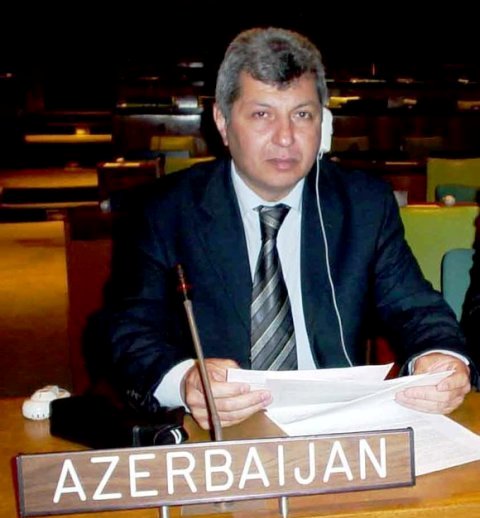Armenia expands ethnic cleansing against Azerbaijani prisoners: State Сommission

By Jamila Babayeva
Armenia is expanding its policy of genocide, terror, ethnic cleansing, and violating international norms of humanitarian law against prisoners and hostages.
The remarks were made by Secretary of the State Commission on Prisoners of War, Hostages, and Missing Persons Shahin Sailov in an interview with Trend Agency on March 11.
He said the State Commission is operating in accordance with the Geneva Convention of 1949 on the protection of war victims, the international legal norms in the field of human rights and freedom, and the Azerbaijani Constitution, laws and other legal acts adopted in the sphere of international humanitarian law.
"However, Armenia is ignoring these international documents and expanding its policy of genocide, terror, ethnic cleansing, and violation of international norms of humanitarian law," Sailov said.
He said the State Commission's working group has collected many facts on the fact that Armenia takes civilians hostage, commits inhumane torture against them, and violates their dignity, blackmail, and threats.
"These facts show that genocide was carried out against people kept in captivity. Hundreds of compatriots were killed, suffering unbearable torment and torture, and even becoming maimed," he said. "Recent investigations showed that 554 Azerbaijanis were killed or died in captivity for various reasons."
Talking about the State Commission's activity, Sailov pointed out that its structure and working group were established in 1993.
"During this period, the State Commission's staff changed twice fully, and several times partially," he said. "The Commission's approach regarding the problem of prisoners, hostages and missing persons has significantly changed. The State Commission's activity was strengthened, and its specific parameters were determined after the staff was fully replaced for the third time in 2004 under President Ilham Aliyev's decree, care and attention."
He said a new period has begun in the State Commission's activity, and radical changes have been made since 2004. "The priority issues, solving personnel problems, and creating a logistics base are the key areas," he added.
He went on to say that the main task is to make a list on Missing Persons and eliminate any differences from a similar list issued by the International Committee of the Red Cross (ICRC) during this period. "This accurate definition, along with the list, is also important in determining the extent of this humanitarian problem," he noted.
"This has also played an important role in implementing the tasks arising from a framework agreement concluded between the ICRC and the State Commission in April 2008. This was the framework agreement on 'Gathering Ante Mortem information and centralized database management of those missing during the Armenian-Azerbaijani Nagorno-Karabakh conflict'."
Sailov said after specification of the lists of missing persons in connection with the Nagorno-Karabakh conflict, 1,070 names were excluded from these lists.
"It was found that 387 of them are alive, 317 were killed in military operations and buried, 351 people were put on the lists again, and 15 people were killed outside the military conflicts," he said.
He also said a working group of the State Commission collected information on 2,292 persons missing, and the corrected data was sent to the International Committee of the Red Cross.
"Currently, we can say that work on specifying the list is over, but the nature of the conflict is such that new data can be received. It is not a coincidence that during this period the fact that 154 people were missing as the result of military operations was revealed. Their relatives have appealed neither to the relevant structures nor to the State Commission. These persons have been registered by the State Commission," he said.
Sailov noted that the collection of materials is a priority for the State Commission. "This work was carried out by the State Commission's working group and the volunteers of the Red Crescent Society of Azerbaijan through the ICRC, within the agreement "Using database AnteMortem / PostMortem" signed between the ICRC and the State Commission on January 26, 2011 and information about 1,495 persons are fully included in the electronic database.
He noted that despite all the evidence, Armenia still denies taking hundreds of Azerbaijanis hostage.
"The State Commission registered 4,013 missing people and 1,412 prisoners and those released from captivity as of January 1, 2014," he said. "The materials were sent to the appropriate international organizations on taking 877 people of the 4,013 missing ones, including 22 children, 99 women, and 133 old people, who were unable to leave their homes for different reasons during the occupation, as captive."
Sailov said based on the testimony of Azerbaijani citizens released from Armenian captivity, a list of these individuals has been compiled, their primary place of detention and other facts were specified. "Despite the evidence, Armenia still denies the fact of capturing these people," he added.
He noted that thanks to the efforts of the State Commission and Mediation Center of the International Committee of the Red Cross, 23 Azerbaijani citizens (16 soldiers, seven civilians) captured by the Armenian soldiers and seven bodies (three soldiers and four civilians) killed in the frontline as a result of violations of the ceasefire and remaining on the territory controlled by the Armenians were transferred to their relatives in 2004-2013.
The investigation also recorded cases of capture and release of 66 people whose names were not included in the list of the State Commission before 2004. In this period, 23 Armenians (12 soldiers and 11 civilians) detained on the territory of Azerbaijan and the two bodies (one military and one civilian) were transferred to the opposite side.
